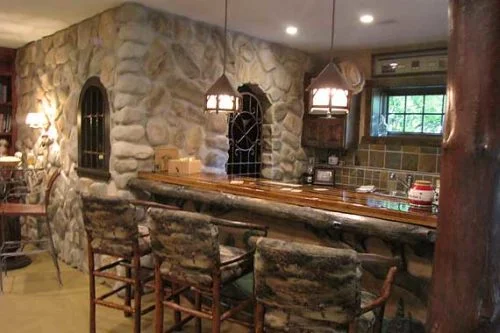The stone bar in one of our custom homes.
We’ve offered you lots of advice over the years about building a custom home. Here is a condensed version of some of the most important tips to follow. Get on the fast track to planning your new custom home!
7 Tips for Building a Custom Home
Pay attention to your subdivision covenants. Yes, these are enforceable and yes, they can greatly restrict not only the type of house you build, but other structures around your home including fencing, sheds and garages. Covenants may even limit the style of your home, including paint colors.
Completely understand the scope of work (SOW). It outlines the work to be performed, and often contains the timeline and a thorough explanation of the work to be performed. Understanding it completely means both parties (builder and customer) are on the same page, with the same goals and expectations.
Understand the pricing model of your builder. Some use a fixed price model where the builder gives a final price for the building of the house. Whereas a cost plus pricing model means the customer pays the actual cost for building the house plus an additional percentage for the builder fee. Both types of pricing offer varying pros and cons. You can read more about these two different pricing models in our blog 5 Key Terms to Understand in Custom Home Building.
Understand the contingency budget and its importance. A contingency budget is a necessary part of building a custom home as it covers any unexpected costs incurred during the construction process, and few custom home projects end without extra unexpected expenses. The benefit is you plan for it from the beginning, and if you don’t need it, the money remains unused and is all yours once the project is finished.
Understand loan types and requirements. Construction loans work differently than conventional home loans. Lenders sometimes consider construction loans riskier than a conventional home loan, and they may have different requirements, such as requiring more money upfront or that you have all building permits secured. For more about financing your custom home read our blog Home Building and Remodeling: Finding the Right Lender .
Choose a house plan based on how long you plan to stay in the home and how your familial dynamics are expected to change. Moving in an older relative eventually? Planning to have more children, or planning to become an empty nester? Your house plan should accommodate your needs for various stages of life if you plan to live in it longer term.
Find the house lot first before choosing the house plan. The lot determines the house size and layout, as well as where you have the best views. A great house plan will take the most advantage of the lot it’s placed on.

